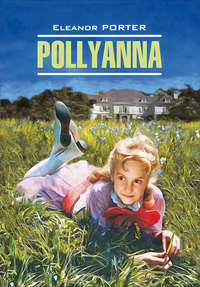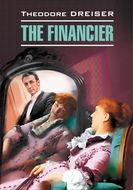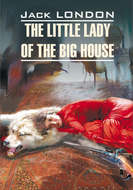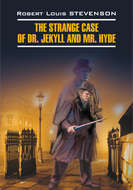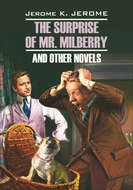Kitabı oku: «Pollyanna / Поллианна. Книга для чтения на английском языке»
To My Cousin Belle
Комментарии и словарь Е. Г. Тигонен
© КАРО, 2016
Chapter I
Miss Polly
Miss Polly Harrington entered her kitchen a little hurriedly this June morning. Miss Polly did not usually make hurried movements; she specially prided herself on her repose of manner. But to-day she was hurrying – actually hurrying.
Nancy, washing dishes at the sink, looked up in surprise. Nancy had been working in Miss Polly’s kitchen only two months, but already she knew that her mistress did not usually hurry.
“Nancy!”
“Yes, ma’am.” Nancy answered cheerfully, but she still continued wiping the pitcher in her hand.
“Nancy,” – Miss Polly’s voice was very stern now – “when I’m talking to you, I wish you to stop your work and listen to what I have to say.”
Nancy flushed miserably. She set the pitcher down at once, with the cloth still about it, thereby nearly tipping it over – which did not add to her composure1.
“Yes, ma’am; I will, ma’am,” she stammered, righting the pitcher, and turning hastily. “I was only keepin’ on with my work ’cause you specially told me this mornin’ ter hurry with my dishes, ye know.”
Her mistress frowned.
“That will do, Nancy. I did not ask for explanations. I asked for your attention.”
“Yes, ma’am.” Nancy stifled a sigh. She was wondering if ever in any way she could please this woman. Nancy had never “worked out” before; but a sick mother suddenly widowed and left with three younger children besides Nancy herself, had forced the girl into doing something toward their support, and she had been so pleased when she found a place in the kitchen of the great house on the hill – Nancy had come from “The Corners,” six miles away, and she knew Miss Polly Harrington only as the mistress of the old Harrington homestead, and one of the wealthiest residents of the town. That was two months before. She knew Miss Polly now as a stern, severe-faced woman who frowned if a knife clattered to the floor, or if a door banged – but who never thought to smile even when knives and doors were still.
“When you’ve finished your morning work, Nancy,” Miss Polly was saying now, “you may clear the little room at the head of the stairs in the attic, and make up the cot bed. Sweep the room and clean it, of course, after you clear out the trunks and boxes.”
“Yes, ma’am. And where shall I put the things, please, that I take out?”
“In the front attic.” Miss Polly hesitated, then went on: “I suppose I may as well tell you now, Nancy. My niece, Miss Pollyanna Whittier, is coming to live with me. She is eleven years old, and will sleep in that room.”
“A little girl – coming here, Miss Harrington? Oh, won’t that be nice!” cried Nancy, thinking of the sunshine her own little sisters made in the home at “The Corners.”
“Nice? Well, that isn’t exactly the word I should use,” rejoined Miss Polly, stiffly. “However, I intend to make the best of it2, of course. I am a good woman, I hope; and I know my duty.”
Nancy colored hotly.
“Of course, ma’am; it was only that I thought a little girl here might – might brighten things up for you,” she faltered.
“Thank you,” rejoined the lady, dryly. “I can’t say, however, that I see any immediate need for that.”
“But, of course, you – you’d want her, your sister’s child,” ventured Nancy, vaguely feeling that somehow she must prepare a welcome for this lonely little stranger.
Miss Polly lifted her chin haughtily.
“Well, really, Nancy, just because I happened to have a sister who was silly enough to marry and bring unnecessary children into a world that was already quite full enough, I can’t see how I should particularly WANT to have the care of them myself. However, as I said before, I hope I know my duty. See that you clean the corners, Nancy,” she finished sharply, as she left the room.
“Yes, ma’am,” sighed Nancy, picking up the half-dried pitcher – now so cold it must be rinsed again.
In her own room, Miss Polly took out once more the letter which she had received two days before from the far-away Western town, and which had been so unpleasant a surprise to her3. The letter was addressed to Miss Polly Harrington, Beldingsville, Vermont; and it read as follows:
“Dear Madam:
– I regret to inform you that the Rev. John Whittier died two weeks ago, leaving one child, a girl eleven years old. He left practically nothing else save a few books; for, as you doubtless know, he was the pastor of this small mission church, and had a very meagre salary.
“I believe he was your deceased sister’s husband, but he gave me to understand the families were not on the best of terms4. He thought, however, that for your sister’s sake you might wish to take the child and bring her up among her own people in the East. Hence I am writing to you.
“The little girl will be all ready to start by the time you get this letter; and if you can take her, we would appreciate it very much if you would write that she might come at once, as there is a man and his wife here who are going East very soon, and they would take her with them to Boston, and put her on the Beldingsville train. Of course you would be notified what day and train to expect Pollyanna on.
“Hoping to hear favorably from you soon,
I remain,
“Respectfully yours,
“Jeremiah O. White.”
With a frown Miss Polly folded the letter and tucked it into its envelope. She had answered it the day before, and she had said she would take the child, of course. She HOPED she knew her duty well enough for that! – disagreeable as the task would be.
As she sat now, with the letter in her hands, her thoughts went back to her sister, Jennie, who had been this child’s mother, and to the time when Jennie, as a girl of twenty, had insisted upon marrying the young minister, in spite of her family’s remonstrances. There had been a man of wealth who had wanted her – and the family had much preferred him to the minister; but Jennie had not. The man of wealth had more years5, as well as more money, to his credit6, while the minister had only a young head full of youth’s ideals and enthusiasm, and a heart full of love. Jennie had preferred these – quite naturally, perhaps; so she had married the minister, and had gone south with him as a home missionary’s wife.
The break had come then. Miss Polly remembered it well, though she had been but a girl of fifteen, the youngest, at the time. The family had had little more to do with the missionary’s wife. To be sure, Jennie herself had written, for a time, and had named her last baby “Pollyanna” for her two sisters, Polly and Anna – the other babies had all died. This had been the last time that Jennie had written; and in a few years there had come the news of her death, told in a short, but heart-broken little note from the minister himself, dated at a little town in the West.
Meanwhile, time had not stood still for the occupants of the great house on the hill. Miss Polly, looking out at the far-reaching valley below, thought of the changes those twenty-five years had brought to her.
She was forty now, and quite alone in the world. Father, mother, sisters – all were dead. For years, now, she had been sole mistress of the house and of the thousands left her by her father. There were people who had openly pitied her lonely life, and who had urged her to have some friend or companion to live with her; but she had not welcomed either their sympathy or their advice7. She was not lonely, she said. She liked being by herself. She preferred quiet. But now —
Miss Polly rose with frowning face and closely-shut lips. She was glad, of course, that she was a good woman, and that she not only knew her duty, but had sufficient strength of character to perform it. But – POLLYANNA! – what a ridiculous name!
Chapter II
Old Tom and Nancy
In the little attic room Nancy swept and scrubbed vigorously, paying particular attention to the corners. There were times, indeed, when the vigor she put into her work was more of a relief to her feelings than it was an ardor to efface dirt – Nancy, in spite of her frightened submission to her mistress, was no saint.
“I – just – wish – I could – dig – out the corners – of – her – soul!” she muttered jerkily, punctuating her words with murderous jabs of her pointed cleaning-stick. “There’s plenty of ’em needs cleanin’ all right, all right! The idea of stickin’ that blessed child ’way off up here in this hot little room – with no fire in the winter, too, and all this big house ter pick and choose from8! Unnecessary children, indeed! Humph!” snapped Nancy, wringing her rag so hard her fingers ached from the strain; “I guess it ain’t CHILDREN what is MOST unnecessary just now, just now!”
For some time she worked in silence; then, her task finished, she looked about the bare little room in plain disgust.
“Well, it’s done – my part, anyhow,” she sighed. “There ain’t no dirt here – and there’s mighty little else. Poor little soul! – a pretty place this is ter put a homesick, lonesome child into!” she finished, going out and closing the door with a bang, “Oh!” she ejaculated, biting her lip. Then, doggedly: “Well, I don’t care. I hope she did hear the bang, – I do, I do!”
In the garden that afternoon, Nancy found a few minutes in which to interview Old Tom, who had pulled the weeds and shovelled the paths about the place for uncounted years.
“Mr. Tom,” began Nancy, throwing a quick glance over her shoulder to make sure she was unobserved; “did you know a little girl was comin’ here ter live with Miss Polly?”
“A – what?” demanded the old man, straightening his bent back with difficulty.
“A little girl – to live with Miss Polly.”
“Go on with yer jokin’,” scoffed unbelieving Tom. “Why don’t ye tell me the sun is a-goin’ ter set in the east ter-morrer?”
“But it’s true. She told me so herself,” maintained Nancy. “It’s her niece; and she’s eleven years old.”
The man’s jaw fell.
“Sho! – I wonder, now9,” he muttered; then a tender light came into his faded eyes. “It ain’t – but it must be – Miss Jennie’s little gal! There wasn’t none of the rest of ’em married. Why, Nancy, it must be Miss Jennie’s little gal. Glory be ter praise! ter think of my old eyes a-seein’ this!”
“Who was Miss Jennie?”
“She was an angel straight out of Heaven,” breathed the man, fervently; “but the old master and missus knew her as their oldest daughter. She was twenty when she married and went away from here long years ago. Her babies all died, I heard, except the last one; and that must be the one what’s a-comin’.”
“She’s eleven years old.”
“Yes, she might be,” nodded the old man.
“And she’s goin’ ter sleep in the attic – more shame ter HER!” scolded Nancy, with another glance over her shoulder toward the house behind her.
Old Tom frowned. The next moment a curious smile curved his lips.
“I’m a-wonderin’ what Miss Polly will do with a child in the house,” he said.
“Humph! Well, I’m a-wonderin’ what a child will do with Miss Polly in the house!” snapped Nancy.
The old man laughed.
“I’m afraid you ain’t fond of Miss Polly,” he grinned. “As if ever anybody could be fond of her!10” scorned Nancy.
Old Tom smiled oddly. He stooped and began to work again.
“I guess maybe you didn’t know about Miss Polly’s love affair,” he said slowly.
“Love affair – HER! No! – and I guess nobody else didn’t, neither.”
“Oh, yes they did,” nodded the old man. “And the feller’s livin’ ter-day – right in this town, too.”
“Who is he?”
“I ain’t a-tellin’ that.11 It ain’t fit that I should.” The old man drew himself erect. In his dim blue eyes, as he faced the house, there was the loyal servant’s honest pride in the family he has served and loved for long years.
“But it don’t seem possible – her and a lover,” still maintained Nancy.
Old Tom shook his head.
“You didn’t know Miss Polly as I did,” he argued. “She used ter be real handsome – and she would be now, if she’d let herself be.”
“Handsome! Miss Polly!”
“Yes. If she’d just let that tight hair of hern all out loose and careless-like, as it used ter be, and wear the sort of bunnits with posies in ’em, and the kind o’ dresses all lace and white things – you’d see she’d be handsome! Miss Polly ain’t old, Nancy.”
“Ain’t she, though? Well, then she’s got an awfully good imitation of it12 – she has, she has!” sniffed Nancy.
“Yes, I know. It begun then – at the time of the trouble with her lover,” nodded Old Tom; “and it seems as if she’d been feedin’ on wormwood an’ thistles ever since – she’s that bitter an’ prickly ter deal with.”
“I should say she was,” declared Nancy, indignantly. “There’s no pleasin’ her, nohow, no matter how you try! I wouldn’t stay if ’twa’n’t for the wages and the folks at home what’s needin’ ’em. But some day – some day I shall jest b’ile over; and when I do, of course it’ll be good-by Nancy for me. It will, it will.”
Old Tom shook his head.
“I know. I’ve felt it. It’s nart’ral – but ’tain’t best, child; ’tain’t best. Take my word for it, ’tain’t best.” And again he bent his old head to the work before him.
“Nancy!” called a sharp voice.
“Y-yes, ma’am,” stammered Nancy; and hurried toward the house.
Chapter III
The Coming of Pollyanna
In due time came the telegram announcing that Pollyanna would arrive in Beldingsville the next day, the twenty-fifth of June, at four o’clock. Miss Polly read the telegram, frowned, then climbed the stairs to the attic room. She still frowned as she looked about her.
The room contained a small bed, neatly made, two straight-backed chairs, a washstand, a bureau – without any mirror – and a small table. There were no drapery curtains at the dormer windows, no pictures on the wall. All day the sun had been pouring down upon the roof, and the little room was like an oven for heat. As there were no screens, the windows had not been raised. A big fly was buzzing angrily at one of them now, up and down, up and down, trying to get out.
Miss Polly killed the fly, swept it through the window (raising the sash an inch for the purpose), straightened a chair, frowned again, and left the room.
“Nancy,” she said a few minutes later, at the kitchen door, “I found a fly up-stairs in Miss Pollyanna’s room. The window must have been raised at some time.13 I have ordered screens, but until they come I shall expect you to see that the windows remain closed. My niece will arrive to-morrow at four o’clock. I desire you to meet her at the station. Timothy will take the open buggy and drive you over. The telegram says ‘Light hair, red-checked gingham dress, and straw hat.’ That is all I know, but I think it is sufficient for your purpose.”
“Yes, ma’am; but – you – ”
Miss Polly evidently read the pause aright, for she frowned and said crisply:
“No, I shall not go. It is not necessary that I should, I think. That is all.” And she turned away – Miss Polly’s arrangements for the comfort of her niece, Pollyanna, were complete.
In the kitchen, Nancy sent her flat-iron with a vicious dig across the dish-towel she was ironing.
“‘Light hair, red-checked gingham dress, and straw hat’ – all she knows, indeed! Well, I’d be ashamed ter own it up14, that I would, I would – and her my onliest niece what was a-comin’ from ’way across the continent!”
Promptly at twenty minutes to four the next afternoon Timothy and Nancy drove off in the open buggy to meet the expected guest. Timothy was Old Tom’s son. It was sometimes said in the town that if Old Tom was Miss Polly’s right-hand man, Timothy was her left.
Timothy was a good-natured youth, and a good-looking one, as well. Short as had been Nancy’s stay at the house, the two were already good friends. To-day, however, Nancy was too full of her mission to be her usual talkative self; and almost in silence she took the drive to the station and alighted to wait for the train.
Over and over in her mind she was saying it, “light hair, red-checked dress, straw hat.” Over and over again she was wondering just what sort of child this Pollyanna was, anyway.
“I hope for her sake she’s quiet and sensible, and don’t drop knives nor bang doors,” she sighed to Timothy, who had sauntered up to her.
“Well, if she ain’t, nobody knows what’ll become of the rest of us,” grinned Timothy. “Imagine Miss Polly and a NOISY kid! Gorry! there goes the whistle now!”
“Oh, Timothy, I – I think it was mean ter send me,” chattered the suddenly frightened Nancy, as she turned and hurried to a point where she could best watch15 the passengers alight at the little station.
It was not long before Nancy saw her – the slender little girl in the red-checked gingham with two fat braids of flaxen hair hanging down her back. Beneath the straw hat, an eager, freckled little face turned to the right and to the left, plainly searching for some one.
Nancy knew the child at once, but not for some time could she control her shaking knees sufficiently to go to her. The little girl was standing quite by herself when Nancy finally did approach her.
“Are you Miss – Pollyanna?” she faltered. The next moment she found herself half smothered in the clasp of two gingham-clad arms.
“Oh, I’m so glad, GLAD, GLAD to see you,” cried an eager voice in her ear. “Of course I’m Pollyanna, and I’m so glad you came to meet me! I hoped you would.”
“You – you did?” stammered Nancy, vaguely wondering how Pollyanna could possibly have known her – and wanted her. “You – you did?” she repeated, trying to straighten her hat.
“Oh, yes; and I’ve been wondering all the way here what you looked like,” cried the little girl, dancing on her toes, and sweeping the embarrassed Nancy from head to foot, with her eyes. “And now I know, and I’m glad you look just like you do look.”
Nancy was relieved just then to have Timothy come up. Pollyanna’s words had been most confusing.
“This is Timothy. Maybe you have a trunk,” she stammered.
“Yes, I have,” nodded Pollyanna, importantly. “I’ve got a brand-new one. The Ladies’ Aid16 bought it for me – and wasn’t it lovely of them, when they wanted the carpet so? Of course I don’t know how much red carpet a trunk could buy, but it ought to buy some, anyhow – much as half an aisle, don’t you think? I’ve got a little thing here in my bag that Mr. Gray said was a check, and that I must give it to you before I could get my trunk. Mr. Gray is Mrs. Gray’s husband. They’re cousins of Deacon Carr’s wife. I came East with them, and they’re lovely! And – there, here ’tis,” she finished, producing the check after much fumbling in the bag she carried.
Nancy drew a long breath. Instinctively she felt that some one had to draw one – after that speech. Then she stole a glance at Timothy. Timothy’s eyes were studiously turned away.
The three were off at last, with Pollyanna’s trunk in behind, and Pollyanna herself snugly ensconced between Nancy and Timothy. During the whole process of getting started, the little girl had kept up an uninterrupted stream of comments and questions, until the somewhat dazed Nancy found herself quite out of breath trying to keep up with her17.
“There! Isn’t this lovely? Is it far? I hope ’tis – I love to ride,” sighed Pollyanna, as the wheels began to turn. “Of course, if ’tisn’t far, I sha’n’t mind, though, ’cause I’ll be glad to get there all the sooner, you know. What a pretty street! I knew ’twas going to be pretty; father told me – ”
She stopped with a little choking breath. Nancy, looking at her apprehensively, saw that her small chin was quivering, and that her eyes were full of tears. In a moment, however, she hurried on, with a brave lifting of her head.
“Father told me all about it. He remembered. And – and I ought to have explained before. Mrs. Gray told me to, at once – about this red gingham dress, you know, and why I’m not in black. She said you’d think ’twas queer. But there weren’t any black things in the last missionary barrel, only a lady’s velvet basque which Deacon Carr’s wife said wasn’t suitable for me at all; besides, it had white spots – worn, you know – on both elbows, and some other places. Part of the Ladies’ Aid wanted to buy me a black dress and hat, but the other part thought the money ought to go toward the red carpet they’re trying to get – for the church, you know. Mrs. White said maybe it was just as well, anyway, for she didn’t like children in black – that is, I mean, she liked the children, of course, but not the black part.”
Pollyanna paused for breath, and Nancy managed to stammer:
“Well, I’m sure it – it’ll be all right.”
“I’m glad you feel that way. I do, too,” nodded Pollyanna, again with that choking little breath. “Of course, ’twould have been a good deal harder to be glad in black – ”
“Glad!” gasped Nancy, surprised into an interruption.
“Yes – that father’s gone to Heaven to be with mother and the rest of us, you know. He said I must be glad. But it’s been pretty hard to – to do it, even in red gingham, because I – I wanted him, so; and I couldn’t help feeling I OUGHT to have him, specially as mother and the rest have God and all the angels, while I didn’t have anybody but the Ladies’ Aid. But now I’m sure it’ll be easier because I’ve got you, Aunt Polly. I’m so glad I’ve got you!”
Nancy’s aching sympathy for the poor little forlornness beside her turned suddenly into shocked terror.
“Oh, but – but you’ve made an awful mistake, d-dear,” she faltered. “I’m only Nancy. I ain’t your Aunt Polly, at all!”
“You – you AREN’t?” stammered the little girl, in plain dismay.
“No. I’m only Nancy. I never thought of your takin’ me for her.18 We – we ain’t a bit alike we ain’t, we ain’t!”
Timothy chuckled softly; but Nancy was too disturbed to answer the merry flash from his eyes.
“But who ARE you?” questioned Pollyanna. “You don’t look a bit like a Ladies’ Aider!”
Timothy laughed outright this time.
“I’m Nancy, the hired girl. I do all the work except the washin’ an’ hard ironin’. Mis’ Durgin does that.”
“But there IS an Aunt Polly?” demanded the child, anxiously.
“You bet your life there is,” cut in Timothy.
Pollyanna relaxed visibly.
“Oh, that’s all right, then.” There was a moment’s silence, then she went on brightly: “And do you know? I’m glad, after all, that she didn’t come to meet me; because now I’ve got HER still coming19, and I’ve got you besides.”
Nancy flushed. Timothy turned to her with a quizzical smile.
“I call that a pretty slick compliment,” he said. “Why don’t you thank the little lady?”
“I – I was thinkin’ about – Miss Polly,” faltered Nancy.
Pollyanna sighed contentedly.
“I was, too. I’m so interested in her. You know she’s all the aunt I’ve got, and I didn’t know I had her for ever so long. Then father told me. He said she lived in a lovely great big house ’way on top of a hill.”
“She does. You can see it now,” said Nancy. “It’s that big white one with the green blinds, ’way ahead.”
“Oh, how pretty! – and what a lot of trees and grass all around it! I never saw such a lot of green grass, seems so, all at once. Is my Aunt Polly rich, Nancy?”
“Yes, Miss.”
“I’m so glad. It must be perfectly lovely to have lots of money. I never knew any one that did have, only the Whites – they’re some rich20. They have carpets in every room and ice-cream Sundays. Does Aunt Polly have ice-cream Sundays?”
Nancy shook her head. Her lips twitched. She threw a merry look into Timothy’s eyes.
“No, Miss. Your aunt don’t like ice-cream, I guess; leastways I never saw it on her table.”
Pollyanna’s face fell.
“Oh, doesn’t she? I’m so sorry! I don’t see how she can help liking ice-cream. But – anyhow, I can be kinder glad about that, ’cause the ice-cream you don’t eat can’t make your stomach ache21 like Mrs. White’s did – that is, I ate hers, you know, lots of it. Maybe Aunt Polly has got the carpets, though.”
“Yes, she’s got the carpets.”
“In every room?”
“Well, in almost every room,” answered Nancy, frowning suddenly at the thought of that bare little attic room where there was no carpet.
“Oh, I’m so glad,” exulted Pollyanna. “I love carpets. We didn’t have any, only two little rugs that came in a missionary barrel, and one of those had ink spots on it. Mrs. White had pictures, too, perfectly beautiful ones of roses and little girls kneeling and a kitty and some lambs and a lion – not together, you know – the lambs and the lion. Oh, of course the Bible says they will sometime, but they haven’t yet – that is, I mean Mrs. White’s haven’t. Don’t you just love pictures?”
“I – I don’t know,” answered Nancy in a half-stifled voice.
“I do. We didn’t have any pictures. They don’t come in the barrels much, you know. There did two come once, though. But one was so good father sold it to get money to buy me some shoes with; and the other was so bad it fell to pieces just as soon as we hung it up. Glass – it broke, you know. And I cried. But I’m glad now we didn’t have any of those nice things, ’cause I shall like Aunt Polly’s all the better – not being used to ’em, you see. Just as it is when the PRETTY hair-ribbons come in the barrels after a lot of faded-out brown ones. My! but isn’t this a perfectly beautiful house?” she broke off fervently, as they turned into the wide driveway.
It was when Timothy was unloading the trunk that Nancy found an opportunity to mutter low in his ear:
“Don’t you never say nothin’ ter me again about leavin’, Timothy Durgin. You couldn’t HIRE me ter leave!22”
“Leave! I should say not,” grinned the youth. “You couldn’t drag me away. It’ll be more fun here now, with that kid ’round, than movin’-picture shows, every day!”
“Fun! – fun!” repeated Nancy, indignantly, “I guess it’ll be somethin’ more than fun for that blessed child – when them two tries ter live tergether; and I guess she’ll be a-needin’ some rock ter fly to for refuge. Well, I’m a-goin’ ter be that rock, Timothy; I am, I am!” she vowed, as she turned and led Pollyanna up the broad steps.
